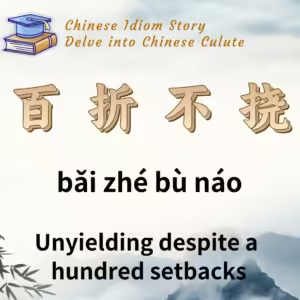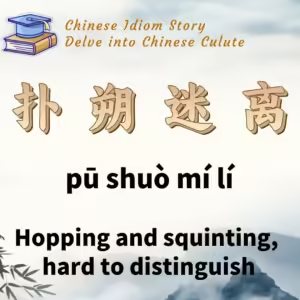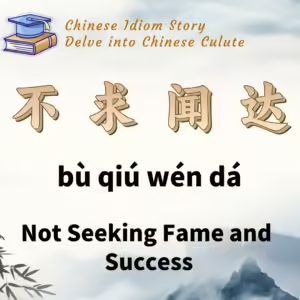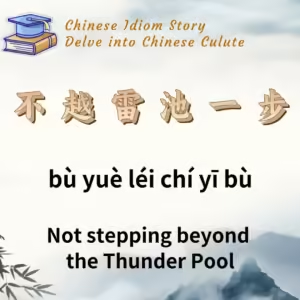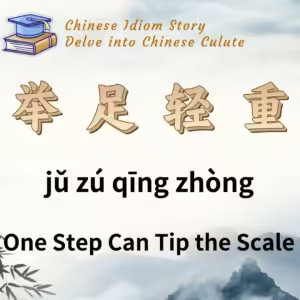
Chinese Idiom: 富贵荣华 (Fu Gui Rong Hua)
English Translation: Wealth, Nobility, and Glory
pīn yīn: fù guì róng huá
Idiom Meaning: This idiom describes a high position with great wealth and power. “富” (wealth) means having money; “贵” (nobility) refers to having a high social status; “荣华” (glory) signifies prosperity and fame.
Historical Source: The idiom is derived from Li Qiao’s poem Fengyin Xing from the Tang Dynasty.
Idiom Story:
After the third emperor of the Tang dynasty, Emperor Gaozong, China saw the rise of a remarkably talented and perceptive female emperor, Wu Zetian. At the age of fourteen, Wu Zetian was selected for the imperial harem of Emperor Taizong due to her beauty and was given the title of “Talent.” After Emperor Gaozong ascended the throne, he summoned her to the palace, where she became a favored concubine and later the empress.
In 683 AD, after the death of Emperor Gaozong, Wu Zetian placed her biological son, Li Zhe, on the throne, who became Emperor Zhongzong. However, within a year, she deposed him and installed her fourth son, Li Dan, as Emperor Ruizong, while she effectively held the real power behind the scenes. In 690 AD, Wu Zetian finally ascended the throne herself, changing the state name from Tang to Zhou. She remained in power until 705 AD, when she was overthrown by Prime Minister Zhang Jianzhi during her illness and restored the Tang Dynasty.
During her reign, Wu Zetian demonstrated exceptional governance skills and helped the Tang dynasty flourish. She was adept at selecting and employing talented individuals and was receptive to advice. After assuming power, she faced opposition from figures like Xu Jingye, who rebelled against her rule. The poet Luo Binwang wrote a famous “Imperial Edict against Wu,” which reportedly frightened Wu, who was ill at the time. Despite the harsh criticism in the edict, she praised its literary quality and acknowledged the talent of the writer, lamenting that such gifted individuals were not employed.
One of her prominent officials, Li Qiao, was known for his exceptional literary talent. His poetry remained influential even into the mid-Tang period. It is said that before the An Lushan Rebellion, one day, Emperor Xuanzong, troubled and anxious, ordered musicians to perform to alleviate his distress. The musicians, inspired by the scenery, sang Li Qiao’s Fengyin Xing. The last four lines of this poem read:
“The mountains and rivers fill my eyes, my clothes damp with tears;
How long can wealth and nobility last?
I see not the present on the Fen River,
Only the autumn geese flying south year after year.”
The last two lines reference a historical anecdote: during the Western Han dynasty, Emperor Wu of Han once enjoyed a boat ride on the Fen River during a fine autumn day, writing a poem that included the lines, “The autumn wind rises, white clouds fly; the grass and trees yellow and fall, the geese return south.” Li Qiao echoed this anecdote, conveying that witnessing the beautiful landscape brings tears to one’s eyes, and questioning how long personal wealth and glory can endure compared to the passage of time. He notes how the grandeur of Emperor Wu’s time has faded, leaving only the annual migration of geese.
Faced with the threat of rebellion and national crisis, upon hearing these sorrowful lines, Emperor Xuanzong wept. After a moment of silence, he quietly asked those around him, “Who wrote this poem?” His attendants replied that it was written by Li Qiao during Wu Zetian’s reign. Xuanzong sighed, saying, “Li Qiao is indeed a talented man!” He left before the music concluded, consumed by sadness.
Subsequently, people began to simplify and extend the line “富贵荣华能几时” (How long can wealth and nobility last?) into the idiom “富贵荣华” or “荣华富贵,” which continues to reflect on the fleeting nature of wealth and status.

